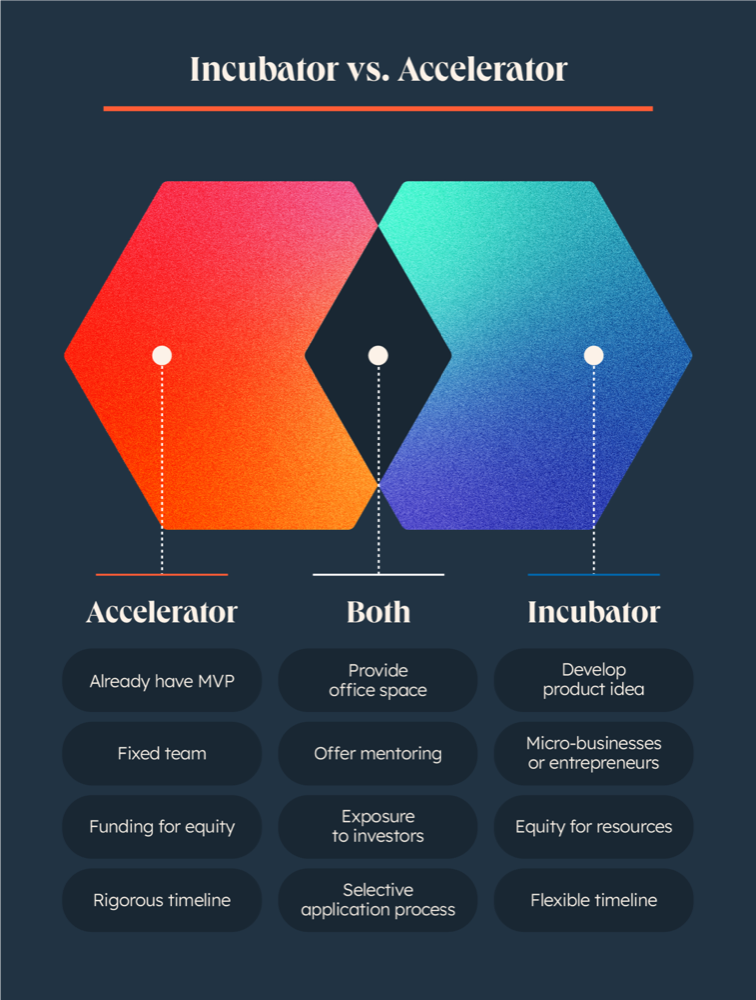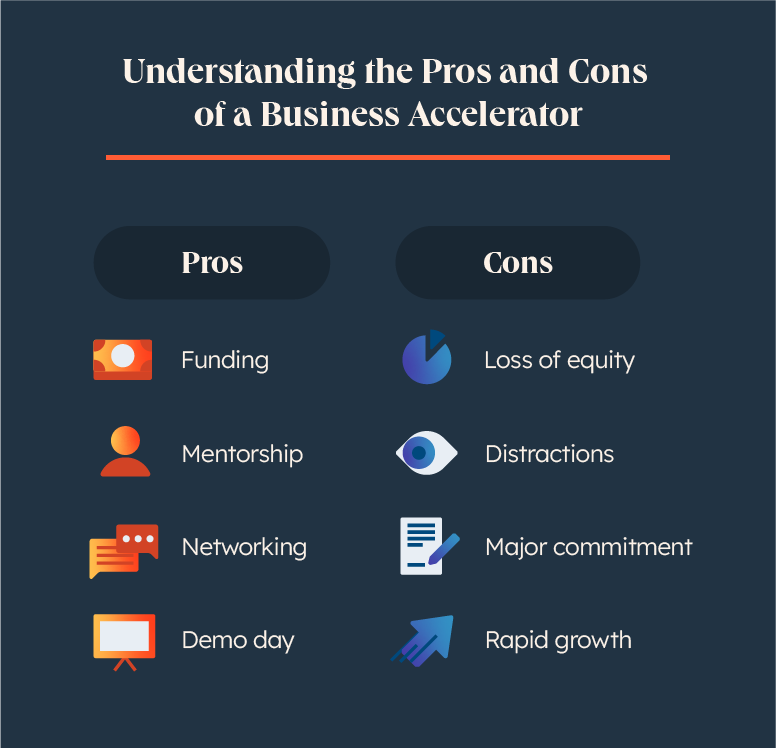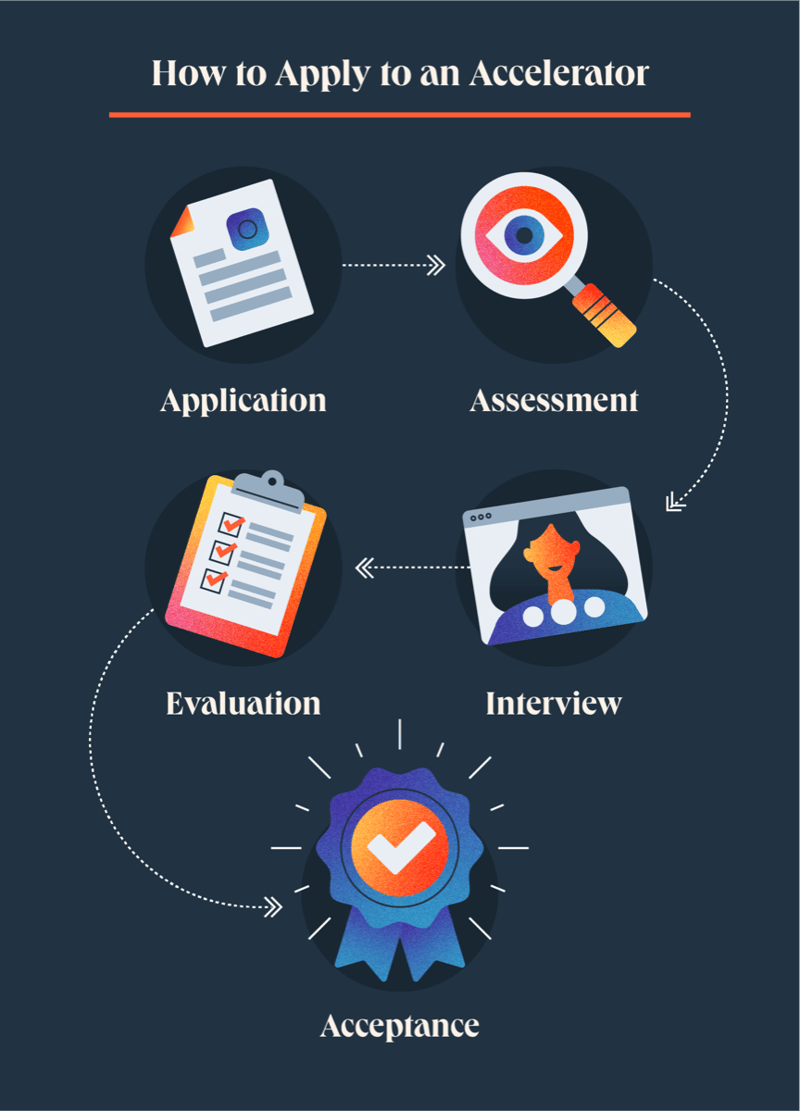Did you know that there are now over 900 private companies valued at $1 billion or higher? Though many of these startups have been able to reach unicorn status on their own, some of the most notable success stories, including Airbnb and Dropbox, used accelerators to scale quickly. But what is a business accelerator, and is it right for your business?
In this guide, we will cover everything you need to know about business accelerators, including what they offer, how they function, and how they can help your business grow.
In this article:
- What is an accelerator?
- How business accelerators work
- What are the benefits of a business accelerator?
- What are the downsides of a business accelerator?
- Accelerator vs. incubator
- Is my business a good fit for an accelerator program?
- How to pick an accelerator
- How to apply for an accelerator
- Accelerator alternatives
What is an accelerator?
A business accelerator is a program designed to help established startups scale quickly, and often provide funding in exchange for equity in the business.
Accelerators often require startups to already have a minimum viable product or a fixed team before they can apply. Once admitted, startups go through an intense period of growth and development, often over the course of three to six months.
During this time, startups receive mentorship and resources from experienced entrepreneurs, investors, and business leaders. Startup accelerators typically culminate in a Demo Day, where startups pitch their businesses to a room full of potential investors.
 Business accelerator program examples
Business accelerator program examples
There are many different types of accelerator programs scattered throughout the world. Some are run by corporations or venture capital firms while others are government- or university-sponsored. Startup accelerator programs can also focus on a specific industry, like technology or health care.
Here is a list of some business accelerator programs and what they offer:
- Draper Startup House Accelerator is an Austin, Texas-based program that offers mentorship, funding, and even co-living.
- V@Ccelerate is a four-month program for startups across India offering networking opportunities and exposure to investors.
- Envision is an equity-free accelerator program with the goal of shining a light on underrepresented talent in the startup industry.
- Women’s Innovation Fund Accelerator is an early-stage impact fund helping underrepresented, sustainable, and emerging tech startups scale quickly.
- Up2B Accelerator is an organization that has a number of different programs aiming to help startups test their products, find investors, or even fine-tune their sales structures.
- TECHHOUSE Accelerator is a 15-week program in Austria helping early-stage technology startups get the funding, mentorship, and resources they need to scale.
- The Long Beach Accelerator is a unique program built by the city of Long Beach that provides startups with capital, coaching, and much more.
- Techstars is a U.S.-based fund with virtual, hybrid, and in-person accelerator programs located across the world.
Incubator vs. accelerator
Startup terms can be difficult to navigate, especially when it comes to programs aiming to help businesses grow. Two of the most common platforms used by startups to scale are accelerators and incubators. Some organizations even offer both.
While it can be confusing, especially considering there is no set of rules to define either, you should be aware of some generalized traits.
Accelerators are three-to-six-month-long programs that are generally only open to startups with a minimum viable product (MVP), while incubators typically look for idea-stage startups with a time frame that can extend beyond the two-year mark.
Another major difference between accelerators and incubators is how each program handles equity and funding.
Accelerators often provide seed funding right off the bat in exchange for equity. Incubators, on the other hand, may ask for equity in exchange for the networking opportunities, office space, and mentoring they provide, while funding or funding opportunities may come at the end of the program.
 How business accelerators work
How business accelerators work
Business accelerators are programs that generally focus on either growth or market access. They do this by providing things like funding, training, networking, and even the opportunity to pitch your business to investors when the program concludes.
These programs can be especially grueling, often involving three to six months of intense coaching, mentorship, required meetings, and more.
Many accelerators work with or are founded by angel investors or venture capital firms, providing an invaluable network for startups to tap into even after the program has ended. While accelerators typically do not charge fees for their services, they will likely require equity in your startup.
The pros and cons of a business accelerator
There are a lot of perks that come with joining a business accelerator, though there are some pitfalls to consider as well. Not every startup needs an accelerator, and getting involved in one before you’re ready could lead to some setbacks and headaches.
 What are the benefits of a business accelerator?
What are the benefits of a business accelerator?
Accelerators provide a way for startups to fast-track their growth. In addition to the resources and mentorship they receive, being part of an accelerator can also help startups validate their business idea, build a customer base, and raise capital. Some of the benefits of a business accelerator include:
- Access funding that can help you stop worrying about your next big project.
- Tap into a network that can help you expand your business and secure investments even after the program has finished.
- Learn tips and tricks that can help your startup blossom from some of the best and brightest professionals in your industry.
- Pitch your startup on Demo Day to investors who can help you scale your business and access new markets.
What are the downsides of a business accelerator?
Overall, business accelerators can be a great way for startups to get their business off the ground. However, it's important to weigh the cons before making the decision to join one. A few downsides of a business accelerator you should consider include:
- Loss of equity can be a tough pill to swallow for some founders.
- Not every business model is fit for rapid short-term growth.
- Accelerators come with serious commitments and could require you to take time away from your family or even move to another city.
- Required meetings, coaching sessions, and other potential distractions could pull you away from work that you need to be doing.
- There is no guarantee that your business will succeed after the program.
Is my business a good fit for an accelerator program?
There are a number of factors to consider before applying for an accelerator program, but a few key questions you should ask yourself before you apply include:
Does my startup have an MVP?
Can I commit to an intense three to six months of work?
Is my business ready to scale?
Am I ready to give up equity in my startup?
Am I ready for a rigorous application process?
If you can answer yes to these questions, then an accelerator program may be a good fit for your business.
H2: How to pick the right accelerator
Once you’ve determined that your startup is a good fit for an accelerator program, the first step is to research what programs will meet the needs of your business. Keep in mind that not all startup accelerators are created equal — some may be a better fit for your business than others.
“Not all startup accelerators are created equal.”
To pick the right accelerator for your business, you must:
- Define what you want to get out of the program.
- Research programs that fit your business model.
- Consider the location, cost, and time commitment required by each accelerator.
Accelerators can provide startups with much-needed resources like access to capital, mentorship, and networking opportunities. But don’t forget that every accelerator is different — it’s up to you to do your research and find the right fit for your business.
How to apply to an accelerator
Now that you’ve picked an accelerator, it’s time to apply.
Each accelerator has different requirements, but in general, you can expect to provide information about your business, your team, your product, and your market. Some programs may also require you to submit a video or pitch deck along with your application.
After you submit your application, your startup will be assessed, interviewed, evaluated, and finally (hopefully!), accepted.
 Business accelerator alternatives
Business accelerator alternatives
Accelerators aren’t right for every startup. If you’re not quite ready for an accelerator or if you don’t get accepted, there are other options available.
- Incubators are programs that typically provide office space and resources in exchange for equity or a fee. Incubators can be great for startups still in the idea or product development stage.
- Venture studios are firms that build and invest in multiple companies at once. They often provide more hands-on help than accelerators, but they also take a larger equity stake.
- Mentorship programs can be helpful if you’re working on a proof of concept or could benefit from the advice of experienced entrepreneurs.
- Boot camps are intensive programs that offer training on specific topics, such as how to raise capital or how to scale a business. They can also be targeted at specific industries.
Remember, accelerators are just one branch of the startup ecosystem. And if you decide an accelerator is not right for your startup, there are many other resources available, including incubators, venture studios, and boot camps — each with its own advantages and disadvantages.
Conclusion
If you’re looking for funding and mentorship to take your business to the next level, an accelerator could be a great fit for you. But if you’re not ready to give up equity or commit to strict requirements, there are other options available.
No matter which route you decide to take, HubSpot for Startups is here to help. Apply today and start scaling your business with a cost-effective and user-friendly marketing-leading suite of tools and resources.





